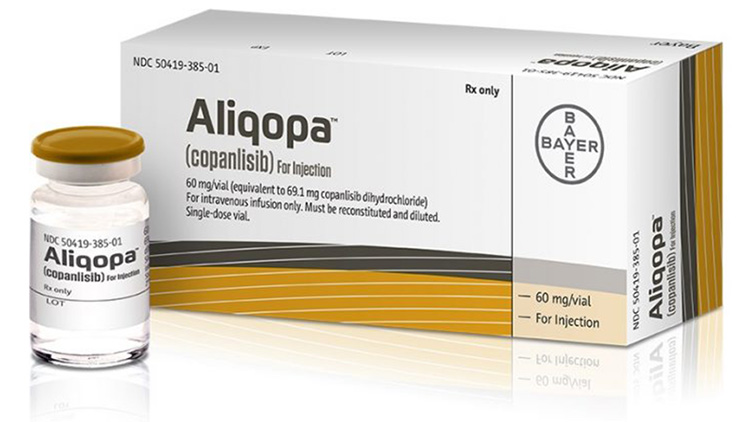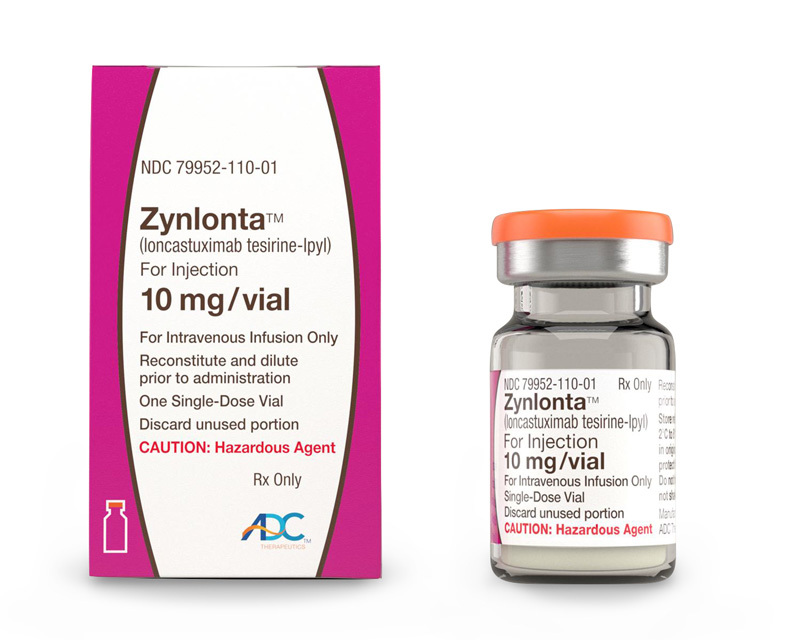Aliqopa (copanlisib) vs Zynlonta (loncastuximab tesirine-lpyl)
Aliqopa (copanlisib) vs Zynlonta (loncastuximab tesirine-lpyl)
Aliqopa (copanlisib) is a kinase inhibitor specifically designed to target and inhibit the phosphoinositide 3-kinase (PI3K) pathway, which is known to play a role in the growth and survival of certain cancer cells, and it is approved for the treatment of adult patients with relapsed follicular lymphoma. Zynlonta (loncastuximab tesirine-lpyl) is an antibody-drug conjugate that targets the CD19 antigen on B-cells, then releases a cytotoxic agent once inside the targeted cells, and it is indicated for the treatment of adult patients with relapsed or refractory large B-cell lymphoma. When deciding between the two, a patient should consider the specific type of lymphoma they have, the side effect profiles, and the mechanism of action of each drug, as well as consult with their healthcare provider to determine the most appropriate treatment based on their individual medical history and condition.
Difference between Aliqopa and Zynlonta
| Metric | Aliqopa (copanlisib) | Zynlonta (loncastuximab tesirine-lpyl) |
|---|---|---|
| Generic name | Copanlisib | Loncastuximab tesirine-lpyl |
| Indications | Relapsed follicular lymphoma | Relapsed or refractory large B-cell lymphoma |
| Mechanism of action | PI3K inhibitor | CD19-directed antibody and alkylating agent conjugate |
| Brand names | Aliqopa | Zynlonta |
| Administrative route | Intravenous | Intravenous |
| Side effects | Hyperglycemia, hypertension, neutropenia, etc. | Thrombocytopenia, neutropenia, anemia, etc. |
| Contraindications | None known | None known |
| Drug class | Antineoplastic agent, PI3K inhibitor | Antineoplastic agent, antibody-drug conjugate |
| Manufacturer | Bayer | ADC Therapeutics |
Efficacy
Aliqopa (Copanlisib) Efficacy in Treating Lymphoma
Aliqopa (copanlisib) is a kinase inhibitor primarily used in the treatment of adult patients with relapsed follicular lymphoma who have received at least two prior systemic therapies. The efficacy of Aliqopa was demonstrated in a single-arm, multicenter clinical trial that included 104 patients with follicular lymphoma. The trial's primary endpoint was the objective response rate (ORR), which reflects the percentage of patients who achieved either a complete or partial response to the therapy. In this pivotal study, Aliqopa achieved an ORR of 59%, with a complete response rate of 14% and a partial response rate of 45%. The median duration of response for patients treated with Aliqopa was 12.2 months, indicating a significant period of disease control for a population with limited treatment options.
Zynlonta (Loncastuximab Tesirine-lpyl) Efficacy in Treating Lymphoma
Zynlonta (loncastuximab tesirine-lpyl) is an antibody-drug conjugate indicated for the treatment of adult patients with relapsed or refractory diffuse large B-cell lymphoma (DLBCL) after two or more lines of systemic therapy. The approval of Zynlonta was based on the results of a multicenter, open-label, single-arm trial, which involved 145 patients with relapsed or refractory DLBCL. The trial's primary endpoint was also the ORR, and Zynlonta demonstrated an ORR of 48.3%, with a complete response rate of 24.1% and a partial response rate of 24.1%. The median duration of response for those who achieved a response was 10.3 months, showcasing Zynlonta's potential as a treatment for this aggressive form of lymphoma.
Comparative Efficacy in Lymphoma Treatment
When comparing the efficacy of Aliqopa and Zynlonta, it is important to consider the differences in the types of lymphoma they are approved to treat. Aliqopa is used for follicular lymphoma, whereas Zynlonta is indicated for DLBCL. Both treatments provide options for patients with relapsed or refractory disease, offering hope for remission even after other treatments have failed. While the ORRs of both drugs are under 60%, they represent meaningful therapeutic options in the context of the severity and the limited treatment options for these conditions.
Conclusion
Both Aliqopa and Zynlonta have shown efficacy in treating different types of lymphoma in patients who have exhausted other treatment options. The clinical trials for these drugs have demonstrated that they can induce complete and partial responses in a significant proportion of patients. Given the complexity and variability of lymphoma, the availability of these targeted therapies provides critical options for personalized treatment plans. As with all therapies, the use of Aliqopa and Zynlonta should be considered in the context of an individual patient's overall health, treatment history, and the specific characteristics of their lymphoma.
Regulatory Agency Approvals
Aliqopa
-
Food and Drug Administration (FDA), USA

Zynlonta
-
European Medical Agency (EMA), European Union

-
Food and Drug Administration (FDA), USA

Access Aliqopa or Zynlonta today
If Aliqopa or Zynlonta are not approved or available in your country (e.g. due to supply issues), you can access them via Everyone.org.
How it works

Make an enquiry
Choose the medicine you want to buy, answer a couple of questions, and upload your prescription to speed things up. We’ll get back to you within 24 hours.


Make an enquiry
Choose the medicine you want to buy, answer a couple of questions, and upload your prescription to speed things up. We’ll get back to you within 24 hours.


Breeze through the paperwork
We'll guide you through the required documents for importing unapproved medicine, ensuring you have all the necessary information.


Get a personalized quote
We’ll prepare a quote for you, including medicine costs and any shipping, administrative, or import fees that may apply.


Receive your medicine
Accept the quote and we’ll handle the rest - sourcing and safely delivering your medicine.

Some text on this page has been automatically generated. Speak to your physician before you start a new treatment or medication.
Let's talk
If you have any questions, call us or send us a message through WhatsApp or email:
Contact us




